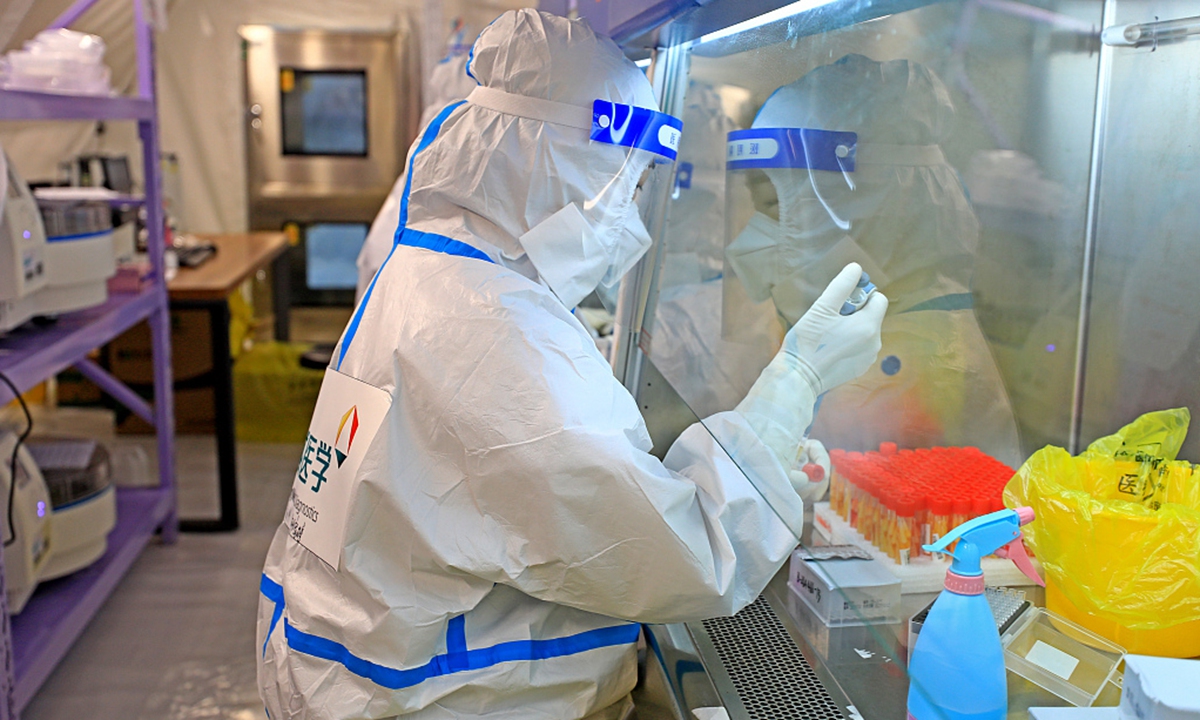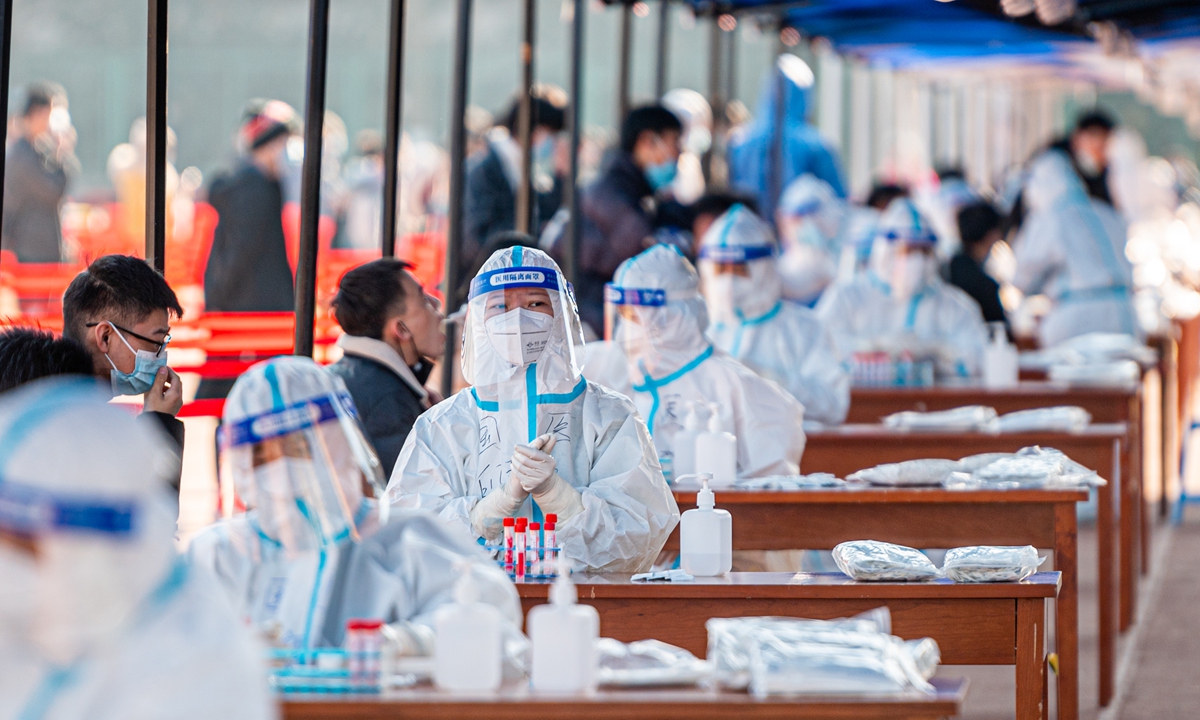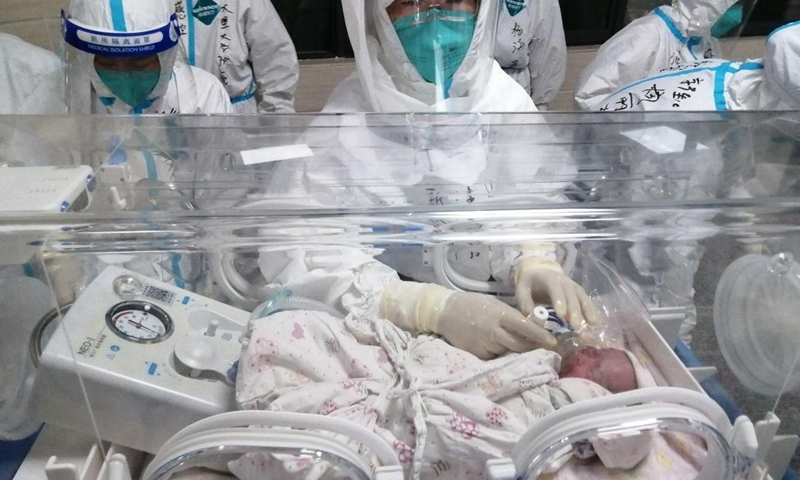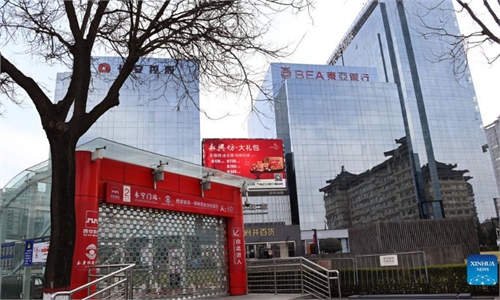At the end of another year under shadow of COVID-19, Chinese people still harbor hope that it will be the 'last cold winter' with the pandemic

A medical worker works at a nucleic acid testing lab in Xi'an, Shaanxi Province on December 26, 2021. Photo: VCG
Looking back over 2021, COVID-19 still tops the glossary of key words Chinese people used to summarize the year, calling it "the second year stolen by the coronavirus."
This year, China has been hit by flare-ups confined to port and border cities such as Ruili in Southwest China's Yunnan Province, Manzhouli, North China's Inner Mongolia Autonomous Region, and Dalian, Northeast China's Liaoning. An outbreak in Nanjing later spilled over into a dozen other provinces, while Xi'an is now experiencing the worst outbreak since the one in Wuhan in 2020, with total confirmed cases reaching 1,117 as of Thursday.
The changes that marked the year are Chinese people's increased ability to adapt to a new life under the shadow of COVID-19; the government's gradual perfection of its "dynamic zero-case policy" to curb infections while minimizing the impact on people's lives, and scientists' achievements in battling the virus. What remains the same is the top-down solidarity to overcome obstacles in face of the pandemic, such as the public's awareness of measures to fend off the infection, which is mirrored by a vaccination rate of as high as 85 percent by year end, and preparations for hosting the upcoming 2022 Winter Olympic Games.
What also remains unchanged is Chinese people's courage in facing the unknowns of the future, as well as confidence and hoping for the best in the coming year.

Medical staff conduct nucleic acid tests at the Northwestern Polytechnical University in Xi'an, Northwest China’s Shaanxi Province on December 21, 2021. Photo: VCG
Disrupted holidays
While most people are immersed in the holiday mood, Yang Jing, a member of the mountain rescue team from the Chinese alpine skiing national team is getting busier while preparing for the coming Winter Olymics. She said that with COVID-19 flare-ups repeatedly emerging this year, her team was required not to leave Beijing the whole year, and they obeyed.
The Global Times learned that after receiving a booster shot, venue staff will enter closed-loop management at the National Alpine Ski Center in Beijing's Yanqing district in mid-January, about two weeks before the start of the Games. They will stay in the closed-off area until April after completing a 21-day quarantine when both the Winter Olympics and Paralympic Winter Games are over. Yang said that they simulated the closed-loop mode last year and it did not have any impact on her life. "After all, we have to fully support such a big national event."
She said the only regret she had is that she could not participate in this event as an athlete, "but I am honored to work just as a service personnel…I feel a sense of mission [for the 2022 Winter Olympic Games], I will do my best to contribute to this event."
"We [support staff of Beijing 2022] will spend the New Year's Day and Spring Festival holidays at our workplaces, just like we did in the past holidays in 2021," Piao Xuedong, head of Beijing 2022's market development department, said at a news conference on Thursday morning, as he wished the media workers on the site a happy new year.
Li Yanling, head of the Beijing 2022 logistics department, thanked her team of 1,600 members. "Half of our core team members are under 30 years of age. We have been fighting through all kinds of challenges in 2021," she said with a sense of pride.
While 2022 Winter Olympic Games personnel are rehearsing ways to deal with COVID-19 threats, people in Xi'an are currently being placed on a real war footing. Having been quarantined at home for two weeks, Ma Li, a Xi'an resident, said this winter might be the most chilling of his life.
Ma and his family were quarantined after coming into contact with a confirmed patient at a hospital. As Ma works in the tourism industry, the latest spike in the city made him worry a lot about his job, as Xi'an, the ancient city home to the world-renowned Terra-Cotta Warriors, is one of the top destinations for Chinese travelers. Many tour agencies in the city have been dealt a heavy blow by the resurgence, and he was unsure that his company would be able to survive this time.
However, he still has hope about the situation. After seeing his wife, a mother of two, fighting on the frontline and always cheering him up despite being exhausted from a long day's work, he suddenly realized that if the virus could not beat the city, it cannot beat him. "Looking back at the beginning of the year 2020, when the streets in Xi'an were also empty, we finally survived. This time, I believe we can survive too."
The small city of Ruili, in Yunnan Province on the border with Myanmar, has gained fame thanks to its prosperous gem business, but it also made headlines in 2021 after going through four rounds of lockdowns this year and was one of the cities most severely hit by COVID-19 in China.
Local residents suffered from the resurgence of the epidemic and the four lockdowns, but the Ruili government managed to meet all the residents' needs, from psychological counseling to daily necessities.
The city has gradually been returning to normal since November. After that, a jade merchant surnamed Jiang who lives in Jiegao, Ruili, was planning to go to Beijing to see his family, whom he hadn't seen since March this year. "Ruili people sacrificed a lot to guard the national gate, but the truth is that local people's lives have been greatly disrupted."
Jiang said that many in the city relied on jade for their livelihood. The industry thrived in recent years thanks to livestreaming and delivery services to help promote and distribute the products all over the country. But when delivery services were suspended by the virus, many of those businessmen received little or no income this year.
The trip from Ruili to Beijing takes just a few hours. But for Jiang, it will take him days or even weeks to get to the capital to visit his family. As Ruili is still marked as a high-risk area, it is impossible to come from Ruili to Beijing, said Jiang, so he is planning to leave Jiegao first, undergo quarantine in Ruili according to the current policy, then go to Mangshi, another city in Yunnan, before making his way to Beijing.
"Hopefully, real normal life can return to Ruili as soon as possible," Jiang said.
Manzhouli, another city in China's north, shared a similar fate to that of Ruili. The city has also been thrown into lockdown several times this year, and the latest outbreak ended with the resumption of normal life in December.
A resident of Manzhouli who wished to remain anonymous told the Global Times that she was much calmer and more experienced during the latest lockdown compared to the first time lockdown on her residential community, during which she panicked and frequently cried.
"I have to extend my gratitude to those volunteers who risked their lives to fulfill our living needs during the flare-up in Manzhouli. And more and more people volunteered each time," she said.
She said her own father, who is in his 50s, also volunteered to help people in quarantine. "I was so afraid that I tried to dissuade him. But he said he had to go because he is a member of the Chinese Communist Party."
Many netizens also flooded to the Sina Weibo account of Dr Li Wenliang, an eye doctor in Wuhan who shared his concerns about an unknown, SARS-like disease with colleagues in a WeChat social media chat group. Li later died from contracting the coronavirus in February 2020.
In addition to an overwhelming number of new year blessings for Li on Thursday, reminding everyone that he has not been forgotten, one netizen wrote: Dr Li, it's been two years, and the pandemic is under control in China. Most people are actively cooperating to prevent the virus spreading, and most of us have had booster shots! The pandemic has taught us more about cherishing our lives.

Medical staff take care of a newborn baby in the special care unit in Ruili, southwest China's Yunnan Province, Aug. 11, 2021. A pregnant woman with COVID-19 Wednesday morning gave birth to triplets in the quarantine area of a designated hospital in southwest China's border city of Ruili, the Yunnan provincial health commission said on Thursday. It is the first case of its kind in China.Photo:Xinhua
Harboring hope
Many of those interviewed by the Global Times still harbor hope that 2022 will be the year that the pandemic ends.
Their hopes stemmed partly from the WHO's forecast that the pandemic could end in 2022, a view echoed by scientists, including widely respected Chinese infectious disease specialist Zhang Wenhong, who assured the public that this winter and the upcoming Spring Festival will be the "last cold winter" we spend with COVID-19.
Zhang Yuexin, a medical expert specializing in epidemic prevention and control in Xinjiang, which has also suffered periodic flare-ups this year, is also optimistic about the coming year. "Both numbers of infections and cases of severe symptoms are in sharp decline this year. The wider public is more cooperative and protective in fending off the virus, we are closer to building herd immunity, and we have established a complete system for detecting, quarantine and treating cases…I have hope for 2022."
Looking back at their experience of fighting COVID-19, the trauma, anguish and malaise have been washed away as they approach the year's end to embrace a new start. The most frequently mentioned words of residents in all those cities that have been ravaged by the virus are: touched, togetherness and hope. "COVID-19, don't come again," said the Manzhouli resident.
The hope expressed by Jiang from Ruili is a much simpler one: "Spring Festival is approaching, I hope I can eventually come back to Beijing to reunite with my wife and kids."

